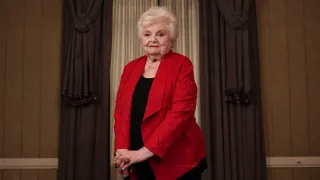May 22, 2016
SFMTA Eyes Castro Parking Lots for Housing
Matthew S. Bajko READ TIME: 5 MIN.
San Francisco's transit agency is eyeing two surface parking lots in the city's gay Castro district as potential affordable housing sites.
As part of a review of its surplus property that could be repurposed to assist with the city's housing crunch, the San Francisco Municipal Transportation Agency has identified the two municipal parking lots in the heart of the gayborhood as being underutilized.
One of the lots, with 20 metered parking spaces accessed from Castro Street, is behind the Castro Theatre and is 6,740 square feet. The second lot, which is entered from 18th Street and exits onto Collingwood, has 28 metered spots on 6,500 square feet spanning two parcels.
They are among five surface parking lots the transit agency has identified as ideal locations to build a "mix" of housing and public parking. Two others are located in West Portal and the fifth is adjacent to the Performing Arts Garage in Hayes Valley not far from City Hall.
"The idea of using public lands for housing is a goal SFMTA enthusiastically supports," said Rafe Rabalais, who oversees strategic real estate for the SFMTA, during a May 9 hearing before the Board of Supervisors' land use committee. "We know that, as a city agency with substantial holdings throughout the city, we know we have a role to play in addressing the affordable housing crisis."
Speaking with the Bay Area Reporter by phone this week, Rabalais stressed that the agency's review of its surplus property is in the preliminary stages and any decisions to move forward with specific developments would not take place until after consultation with the public.
"Our intention is to do some initial outreach to key stakeholders in the neighborhood," said Rabalais. "We will be sharing concepts rather than saying this is what we want to do."
Gay District 8 Supervisor Scott Wiener, who represents the Castro and sits on the board's land use committee, told the B.A.R. he supports building affordable housing on the two parking lots in the gayborhood.
"Whether 100 percent affordable or a very high percentage of affordable, it is a great opportunity to bring significant affordable housing to the heart of the Castro," said Wiener, who noted "there are a lot of different segments of our community in desperate need of affordable housing, such as people living with HIV, seniors, at risk youth, and others."
Asked if he would support a redevelopment project that eliminated the parking on the lots, Wiener would not rule it out, saying doing so would be "a topic of discussion." Noting that the talks to redevelop the lots are still in the early stages, Wiener said he would wait to hear more concrete plans from the SFMTA before making a decision.
"If you put parking in, it increases the cost. We also know our merchants depend on those parking lots. I want to make sure we are sensitive to that and everyone is at the table as we move through those decisions," said Wiener. "I think there is a good argument for having publicly accessible parking. With that said, I will not draw any conclusions until we have an analysis of what that would mean in the context of specific types of projects."
Both of the lots are relatively small, and it is unclear if it would be financially feasible to include public parking as part of a housing development. Rabalais told the B.A.R. he couldn't say what might be proposed for the Castro lots until the draft report is released.
"The consultant is looking at a variety of scenarios," he said. "It will depend on the geometry of the sites how many housing units and parking can be accommodated site by site."
Also expressing support for repurposing the SFMTA parking lots was District 6 Supervisor Jane Kim, who encouraged the agency to also look at sites it owns in neighborhoods she represents, such as the South of Market area.
"It is great to see SFMTA is looking very closely at its portfolio for opportunities for affordable housing," Kim said during last week's hearing. "I think it is great we are looking at surface parking lots."
Castro Lots Long Eyed for Housing
This is not the first time the Castro's two city-owned parking lots have been considered as ideal locations for affordable housing. Back in 2007 the AIDS Housing Alliance/San Francisco, which recently changed its name to the Q Foundation, floated an idea of using the sites to build housing for people living with HIV/AIDS.
The nonprofit had suggested that both parking lots could be rebuilt with underground parking, ground floor retail, office spaces, and housing for HIV-positive people or those with disabilities. The retail could then employ the residents, offering them some stable income.
Two years later the nonprofit released concept drawings for a 65-unit housing development with parking on the L-shaped lot behind Walgreens at the corner of 18th and Castro streets. The design called for four floors built over the existing parking spaces.
Adjacent to the driveway on 18th Street would be a retail space on the left side and the entrance to the apartments above on the right side. The design plan was dependent upon acquiring the existing building at 4122 18th Street, which had housed Magnet, the gay men's health center, and is now for lease.
As for the L-shaped parking lot behind the Castro Theatre, the proposal called for 35 units of housing above parking. There had also been talk about setting aside two floors of the building for queer performing arts company Theatre Rhinoceros.
The preliminary plan for the site also called for acquiring the building adjacent to the entrance to the parking lot, which now houses Eureka Cafe, Sliders, and Care Plus CVS Pharmacy.
Nothing ever came of the plans, however, and the proposals were shelved. With the SFMTA now renewing the idea of seeing housing be built on the two lots, the Q Foundation is again advocating that whatever be built benefit members of the city's HIV and LGBT communities.
"We are exploring waking that project back up," Q Foundation co-founder and director Brian Basinger told the B.A.R. this week.
He said city Planning Commissioner Dennis Richards, a gay man who joined the Q Foundation's board last year, is taking the lead on the nonprofit's interest in seeing the two Castro parking lots be redeveloped. Richards has been informally talking to neighborhood leaders about the proposal.
"Obviously, we are all concerned with what is happening in the neighborhood around displacement, especially with people living with HIV and AIDS," said Richards, a Duboce Triangle resident.
Should the SFMTA move forward with seeking development proposals for the lots, Richards suggested the Q Foundation could team with an affordable housing developer to pitch its plans, which would include building underground public parking.
"If there is no parking, I think the merchants will not be happy. There has to be some parking," he said. "We are still a regional destination. People drive here to come to the Castro."






